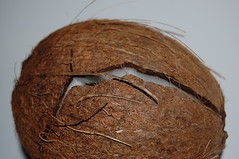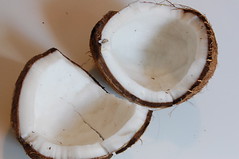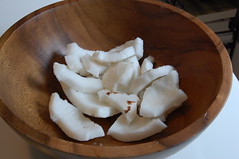No one wants to think or talk about this subject but it is important to acknowledge. Why ? Because it is still happening today in the form of human trafficking ! Us humans never seem to learn. This is an article written by my friend Nancy Ricci. Her ancestry goes back to Suriname in South America one of the biggest plantation labor populations that Dutch colonials established in the 1800's. They were notorious for transporting human lives across oceans to fulfill their labor shortage on plantations and also in their military rank and file. The pain and loss in slavery remains in the collective gene memory through generations as evidenced by this article.
In which a Coconut evokes Memories and Ponderings
June 6, 2008
Just the other day, I was craving for a traditional Javanese dish prepared with freshly grated coconut. I was so happy to find some fresh coconut at my grocery store and could not wait to prepare my Javanese dish!
As I am getting ready in my kitchen to crack open the hard shell of the coconut, I could not foresee that the whole handling and preparing process of my craved after dish, would evoke strong and loving memories of my parents and ponderings about my great grandmother.
Cascade of Memories
A fresh coconut contains water inside of it. When you shake the coconut firmly you can hear the water going back and forth. Before I crack the nut open I make sure to poke a hole with an icepick in one of the “eyes”, drain the delicious liquid, and then crack it open with a hammer in order to release its yummy white “flesh”.
While I watch the coconut break open into two pieces, I suddenly see my mother and father standing in the kitchen of our old appartment in Amsterdam, the Netherlands. My father is cracking open a coconut, while my mother patiently waits, her bowl and grate tool right at her side on the kitchen’s countertop.
Funny how memories are suddenly summoned like that…
As I am releasing pieces of coconut from the broken hard shell, I remember how my father did that too, with a frown on his forehead out of mere concentration. As soon as the pieces are all peeled and cleaned, he passes them to my mother who then starts grating.
Just like my mother I have my bowl and tool ready and I start grating. The movement of my right hand holding a piece of coconut going up and down the grate tool is repetitive and together with the grating sound, my mind is put in a state of ease and I ponder about the family recipe I am about to make.
A written recipe I have not, all instructions have been passed down by spoken word. As I wonder why the recipe has never been written down, I realize that my great grandmother never knew how to read and write. Born in the poorest part of West Java, Indonesia, she never received proper education and remained illiterate for the rest of her life.
My right hand is still going up and down the grate tool, and the pristine white grated cococnut is accumulating in my bowl. In the same speed, questions start to accumulate in my head regarding my family’s history.
Pondering about my great grandmother
In early 1900 at the very tender age of barely 17 years old, my great grandmother was taken against her will to a ship called Djebres & Prins Willem. This boat was destined to sail to a country she did not know even existed called Suriname where she and many other Javanese people were destined to work on the sugar cane plantations.
Was she scared during her journey at sea? Did she make friends during her journey? Did they cry together and comfort eachother, telling each other that everything is going to be allright and that they will return to their families really really soon?
And when she finally arrived in Suriname, South America, what emotions and feelings would run through her whole being? Would she ask her self: “Where am I? Why am I taken here? When can I go back home to my family?”
I pause grating for a moment, hang my head and cry for my great grandmother. She never returned to Java, Indonesia and was never to see her family again as long as she lived.
How I wish I can talk to her now. How I wish I can tell her my ongoing story. I would tell her that I have grown to become a confident, well educated, well spoken young woman. I would tell her that I speak several western languages but only master two of those languages: Dutch and English.
I would tell her that just like her, my parents crossed an ocean to go to a far away country called the Netherlands. I on my turn traveled even further to the United States of America. The significant difference, however, is that neither my parents or myself traveled against our wills. We were free to make that choice ourselves.
I would tell her that her forced travel, trials and tribulations have not been for naught.
The recipe you might wonder..?
I may share little knitting patterns.
I may share pattern tutorials.
I may share my knowledge of knitting.
I may share stories.
I may share pictures.
However, a family recipe that has been passed down for generations… I will share not.
So I just leave you with a photo of beautifully, hand grated coconut, ready to be transformed into a yummy traditional Javanese dish.
Thanks for reading and until the next entry..!





